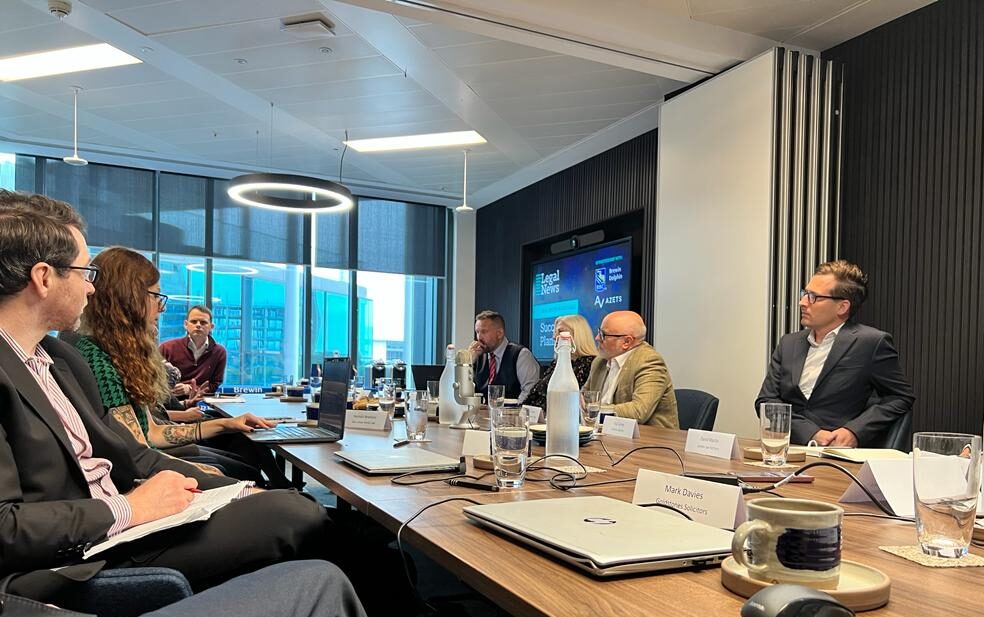I invited legal practice owners in Wales to join me for a frank and honest roundtable discussion about succession planning, with the aim of exploring the success stories and challenges facing law firms in Wales when it comes to retirement, exit planning, and engaging the next generation of equity owners in the profession.
The result is a two-part Succession Planning roundtable series, starting with the aim of scene setting and discussion to produce an ‘ask’ for support from law firms (which is covered below). The second part – a roundtable with a panel of succession planning experts – will feature in a follow-on article, exploring the options and tips for law firms, exiting partners / directors and future leaders.
Part One: The Law Firms
Sharing their succession planning experiences are:
- Mark Davies, Director, Goldstones and Chair of The Law Society’s National Board for Wales
- Paul James, Partner and Head of Commercail Services, Redkite Solicitors
- Gareth Jones, Managing Director, Gomer Williams & Co Solicitors
- Nerys Llewelyn Jones, Director (and immediate past Managing Director), Agri Advisor
- Caron Rockey, Director, Martyn Prowel Gartsides
- David Martin, Partner, Carbon Law Partners
- Hannah Newberry, Chair of the Cardiff and South East Wales JLD & Solicitor at Hugh James
- Clive Thomas, Managing Director, Watkins & Gunn
- Richard Jones, Engagement Manager, The Law Society Wales Office
Also joining us to listen in, with a view of providing some succession planning ‘answers’ in our next roundtable, were:
- Katherine Broadhurst, Partner, Corporate Finance, Azets
- Oliver John, Tax Director, Azets
- Greg Tait, Assistant Director, Financial Planner, RBC Brewin Dolphin
- Jack Whittaker, Investment Manager, RBC Brewin Dolphin
- Karen Jones, Director, TSR Legal Recruitment
Future leaders: aspirations for equity
To start the conversation, Legal News Wales asked the next generation of equity leaders what their hopes and aspirations are for their careers, and to understand what challenges they feel are most pressing in the rise to equity, especially in light of some potential myths arising around aspirations to lead thanks to conversations over the past three years that suggest junior lawyers are increasingly less likely want the risk or lifestyle restrictions.
During the pandemic, pretty much every event I attended discussed the hopes for a changed work-life balance post lockdown. This focus, blended with the recruitment and retention power being weighted in the favour of candidates also opened candid discussions on what junior lawyers wanted in the future. ‘Less time in the office’, ‘dress down days as standard’, ‘greater non-financial benefits’ and ‘better opportunities without the strain of partnership’ were the tomes of the day – proposing the notion that junior lawyers no longer aspire to equity partnership.
What do junior lawyers think? Top 8 concerns for succession
Shortly before the roundtable took place, Legal News Wales ran a temperature check of junior lawyers[1], sharing three questions via our socials, and through the Welsh Junior Lawyer Division networks.
When we asked: ‘do you aspire to being an equity partner or director?’ 80% of respondents said yes, and 20% said no. So far, so good for succession, but I thought it wise to ask a little more of their time (without creating a full-on survey at this stage) to explore the challenges around getting to partnership.
Transparency on how to get there is a clear issue. We asked if the pathways to equity partnership / directorship are clear in their firm. Only 20% said yes, and the rest gave an emphatic ‘no’.
Finally, the hurdles. Raising the cash to finance equity has already been mentioned as a challenge. What did our respondents say could prevent them from buying into the boardroom? We asked junior lawyers to rank their top three ‘getting to equity’ concerns, and these are the top eight concerns:
- Raising funds
- Training and development – getting access to leadership skills and other support at an early stage would help inspire confidence to take such a huge step.
- Concerns over work-life balance – and unknowns about the responsibilities of being an equity partner or director.
- Feeling confident in the culture of their firm.
- Concerns over the ambitions and sustainability of their firm
- Too many partners – not enough opportunities to be visible – or get their voice heard if they did buy in
- Caseload concerns – not getting the right work to show their worth
- Lack of partnership opportunities in their current firm
I asked Hannah Newberry, Chair of the Cardiff and South East Wales JLD is this resonated with her, and the wider JLD membership.
“There’s some disparity in our JLD committee on this, with thoughts resting on the structure of the firm that they’re in.” she says. “For example, when I spoke to our members, there were concerns that in the next five years, some firms could end up with more partners than solicitors. Can you then ever be more than a face at the table? Now, more than ever, junior lawyers and now Senior Associates are moving firms and thinking strategically about their futures.”

“A response I found quite interesting is that we’re all a bit too busy to think about partnership. My colleagues aspire to it in general but we’re so overwhelmed. Some junior lawyers have only just qualified, want to ensure they’re working in the right firm for them, are struggling to get mortgages (let alone think about financing partnership) and are overwhelmed with work as there’s a recruitment deficit.”
“The main point for me though is one of transparency around succession planning. Our committee, for example, is naturally comprised of proactive professionals who want to make a name for themselves. They would want a prominent voice at the table as they progress their career, but we really want to know what that entails – especially when it comes to the financial management aspect of running a law firm. We need to remember that not all fee earners manage their own billing, let alone have sight of anything more strategic.”
With the pandemic (hopefully) behind us, I asked Clive Thomas, in his role as Law Society Council Member for South Wales what his thoughts were on the results we gathered. He says:
“I regularly hear and read that junior lawyers don’t want to be partners in a law firm, but I’ve really ever seen that to be honest, our people always seem to aspire to partnership. Now that we have incorporated, they can be directors within our structure so hopefully it’s even more attractive than once it was.”
Richard Jones, from The Law Society’s Wales office, agrees. Most lawyers he speaks to in Wales ‘are aspirational and hope to make equity’. However, he feels ‘the biggest threat to every law firm in England and Wales right now is undoubtedly recruitment and retention’, which impacts the ability for firms to create robust succession plans, adding:

“By the time equity is on the table, it’s increasingly likely the ideal candidate has left. Right now, people just aren’t staying in one firm long enough. Potential leaders need to be talent spotted earlier – why not encourage someone who may only just have qualified but who’s a five-star lawyer with the commitment and ambition to get the support they need to progress?”
The partners: the current position
With a diverse mix of practitioners, careers and law firms around the table, I asked my guests where their firms are with succession planning today and the challenges they face.
Mark Davies, Goldstones Solicitors, said he recognises succession is now no longer something he can put on the back burner. He has ‘never having had a conversation about succession planning with anybody, ever’ before he became an equity partner (the firm has now incorporated), adding:
“The day succession reared its head was when my then boss said to me ‘would you like to buy me out of the firm’? It wasn’t that strategic. Succession planning has to start much earlier, it’s a whole-firm issue.”
He, like others around the table, was keen to hear how succession planning can be something to embraced and not feared, not only personally by equity holders, but for the business.
At Redkite Solicitors, succession planning has driven the firm’s growth and acquisition plans, as Paul James, explains:
“Around seven years ago, Redkite was predominantly a West Wales-based business. We had five offices, and employed around 70 people. At the time, the partners, myself included, were aged between 30 to 45 years old and we asked ourselves ‘what do we want Redkite to look like, is this enough for us?’ We felt it wasn’t and created a growth strategy. We felt the best way to grow was through acquisition. We knew there were a pool of successful, small firms that hadn’t thought about succession planning but faced exit and retirement challenges. They couldn’t afford it and couldn’t get out.”
“So Redkite helped them; we took the firms on, with some former partners remaining with us as consultants for a couple of years, ensuring a smooth transition for clients.”

“We’ve worked hard to create clear acquisition processes, support, opportunities and training to embed our culture and approach from day one. This growth strategy (despite the inevitable acquisition calming during the pandemic) has helped us achieve significant and steady growth ever since.”
To date, Redkite has undertaken seven acquisitions. It now has 17 offices from Pembrokeshire to Herefordshireshire, with offices in Cardiff, Swansea, Bridgend, Cirencester and four in Gloucestershire. The law firm employs over 260 people and is reaching its turnover target set at that discussion seven years ago. Arguably, Redkite has made the most of the lack of succession planning – offering a model for smaller law firms to engage with, whilst enabling exiting partners to do just that, and recoup the value of their hard work.
The growth of Redkite has inspired other regional law firms to do something similar – in particular, another ‘heritage’ high street firm led by younger directors.
When I first met Gareth Jones and Juliet Phillips-James in 2012, they had very recently bought out the former partners of Llanelli-based Gomer Williams & Co Solicitors, becoming the youngest partners in the firm’s now 100-year history. Since then, the firm has expanded to become one of the biggest law firms in Llanelli. It has two offices in the town, and has expanded outwards to Cockett, Ammanford and recently in Merthyr Tydfil.

“In 2012, Gomer Williams & Co’s turnover was just shy of £100,000 a year; it was a struggling business. I think this year we’re turning over just shy of £2million. We’re aiming to progress a very similar model to Redkite – although not on the same level obviously, because we haven’t got the same infrastructure, but we’re growing, and with an eye on doing that sustainably,” Gareth explains.
Growing the number of directors in the current market is tough going, he adds:
“We’ve had three new equity partners in the last 12 months but the difficultly they had to find funding to buy into the company was unbelievable. We had discussions with various banks and in around 90% of cases, the doors were firmly shut – a direct result of the current economic climate. Eventually we got the deals through. We now have five equity directors and, for succession planning purposes and for talent retention, we’ve created two tiers – directors and junior directors. This helps us to put people in a good position to move forwards with us.”
As with many law firms with a Legal Aid contract, both Gomer Williams & Co and Goldstones Solicitors have been ‘ravaged’ by staff retention issues, with many moving to the CPS or leaving to join the Bar. As Gareth explains:
“They left because they’re concerned about the future of Legal Aid, and the impact of these cuts on their future. This adds stress to our succession plans,” he said, adding:
“We’re trying to counteract recruitment and retention pressures – which are more acute in criminal law, with how we run and grow the business. We don’t want to get too big too soon, we need to provide opportunities to develop, earn and grow, and we want to ensure our people are with us on the journey. That’s about ensuring we have a strong culture to support our people, which we are able to do.”
The directors at Gomer Williams are also keen to create clear pathways for career progression, to avoid the experiences that Gareth had earlier in his career, where ‘promises for development to partner were unfulfilled. For anyone that stays with Gomer Williams and Co, and has the ambition to rise, the message is: ‘we’ll help you get there’.
The story for Agri Advisor, a specialist rural firm of solicitors and agricultural advisors, varies again. Nerys Llewelyn Jones founded the business from scratch in 2011, arguably with an advantageous position of taking the best from other law firm models and embedding best practice from the start. However, Nerys admits that succession planning is hard for all law firms, on many levels:
“We’ve always tried to be very proactive about succession planning, but there are barriers in terms of people buying into equity. Funding has become a major issue. If they can get funding, then the interest rates are eye-watering. Additionally, partnership isn’t for everyone – even if they can fund it. We’ve all seen people become Equity Partners or directors who probably shouldn’t – where decision-making doesn’t suit them at all.”

“If you find someone with the funding, and the leadership skills, or someone who fills a gap around the top table, you then need to sell the opportunity – with all the risks and stresses associated with running a law firm. The run-off cover is a particularly difficult pill to swallow. It’s a hard sell to the next generation; they’ve got to have a real passion for it.”
Caron Rockey agrees. Martyn Prowel Gartsides (the new name for the firm since acquiring Newport-based Gartsides Solicitors in 2022) offers a wide range of privately funded and Legal Aid legal services to clients across South Wales. She says:
“Gartsides had built this brilliant business but because they were busy keeping the firm going, they didn’t have anyone to pass it over to. The acquisition worked out well for us, we all get on really well and it’s a great fit, but would I want acquisition for my firm in the future? I don’t think I do. That led me to think heavily about the future of Martyn Prowel Gartsides and the implications of succession.

“It is hard for the next generation to find the funding, and not everyone wants to be a director of a company these days – it comes with a lot of pressure and financial commitment. I don’t know if it’s as attractive as it was.”
Caron believes that candid discussions and experience sharing is incredibly use for law firms: “I think it’s important to think differently about this and explore the other options – and know what they are,” she admits.
Another well-known high street law firm in the South Wales market is Watkins and Gunn – which incorporated in 2021 from a traditional partnership model ‘to gain a more corporate structure’. As part of this structure bearing fruit, the board of directors recently sat down to share their future plans, guided by an external consultant. Clive Thomas, said:
“We invited a consultant to come and talk with the directors, to help us set a vision based on what we wanted to achieve. She enabled us to have all the difficult conversations that we don’t normally have as a group.”

“We were asked what we wanted as individuals, and what we thought the firm could and should look like when we wanted to retire. It was fascinating; you’d think we would know everyone’s thoughts on this already, but we didn’t, so we learned an awful lot.”
I asked if there were there any awkward surprises; did anyone want to retire sooner than the other thought? “Thankfully, we’re all pulling in the same direction,” Clive laughed. “There were a couple of surprises and that’s OK, we can plan for them if we know about them and make that happen.”
I wanted to add a voice from a different vantagepoint – one who on the face of it, may not have the same succession concerns that other law firms face. David Martin is a Partner at Carbon Law Partners – an Alternative Business Structure (ABS) platform for lawyers ‘looking to grow their own sustainable and profitable legal practice’.
Something David ‘really likes about Carbon Law is that, essentially, you have the benefit of creating your own practice and your own destiny at heart with none of the cost of setup or buying into a law firm’. He adds:

“And at the end point, there are succession processes within Carbon Law that allows you to sell what you have built to others within the platform. There’s something to be said for owning something you’ve built, but more importantly I know exactly where I can go to sell and that can be attractive.”
Generational issues?
David suggests that there will always be generational differences, and that in his experience, ‘the generations that follow us [those in the roundtable] are concerned with experience gathering, highlighted in junior lawyers’ readiness to move firms.’ He said:
“From day one, it is essentially built into us that we want to aspire to be a partner – what we’re all told ‘if you succeed in your career, you’ll be a partner. If you haven’t, you won’t. And it is quite that binary.
“We need to refine the offer in line with the aspirations of the next generation and that comes from talking to our people. Plans should be evolutionary instead of binary, ensuring individuals are able to get enough experience under their belt for what we would describe as ready for ‘partner’.”
Karen Jones, TSR Legal Recruitment, agrees that lawyers are increasingly looking for a great culture and opportunities – but don’t always know exactly what they want or how to get there. She suggests law firms could do more to tackle this uncertainty with clear development paths.
“I’ve worked in legal recruitment for over 25 years, and no matter the times, succession is complicated. Hannah touched on it earlier. A lot of people go into law and don’t have a clear vision as to where they want to be. They’re told they want to be a partner, but don’t always know how to get there when stuck in the day-to-day.”
Karen also warns against the assumption that everyone aspires to taking equity – and that the myths around it can put people off:
“The last three years have shown us that lifestyle is so much more important to people now. As a result, we see the rise in the Legal Director role, offering people the chance to step off what someone recently described to me as the ‘tunnel of hell’ towards equity. As a result of a change in mindset, we’re seeing more salaried partner positions.”

“The choice of a nice house, a family, childcare, great work, a nice lifestyle, and benefits without the risks can be attractive. You need to open the doors on how equity partner/directorship works in your firm, what’s expected of people and the support on offer – before and after taking the leap.”
Clear succession pathways
Which leads to the obvious question: are law firms doing enough to offer greater succession planning transparency and understand the expectations and ambitions of the lawyers they employ?
Nerys outlines the benefits of carving out significant time and resources to tackle these needs:
“We took our whole firm away for three days to talk about our plans and to let everyone ask us whatever they wanted about the business. Nothing was sacred. It was incredibly revealing, in that I assumed they knew more than they did. The things that I thought were being communicated well probably weren’t. I think we’re all guilty of that. I know for a fact that we have retained staff off the back of that exercise because they know exactly what the position is – we were an open book.”
“The most common questions were on financial management and how decisions are made. There were concerns that decisions were taking too long to be made, so we’ve addressed that – and importantly, communicated how we make decisions and why.
“Off the back of the away days, we created a new career progression plan – covering status as well as roles within the business. We’ve created the ability for people to take leading roles in the business, regardless of their status – for example, associates leading on technology.”
We also make the same offer to everyone when it comes to moving to partner level. They can choose to be a salaried partner or an equity partner – allowing some to make that equity decision sooner than perhaps is common. Those three days away were the best investment we ever made in our people, and in terms of understanding aspirations and communicating opportunities to progress.”
Paul agrees that transparency and structure prevails when it comes to succession planning:
“Redkite has a complete career pathway framework for all – whether you’re a receptionist in our Pembroke office or a salaried partner in Cardiff. It explains how you can take the next steps in your career at Redkite in each area of the business. We have two annual promotion rounds, where you have to show that you’ve hit the framework before you can move on. This guidance and transparency has been absolutely fundamental to our retention.
“As every leader has a different set of attributes, we have three strands of leader within in our business and want each individual to play to their strengths: technical leaders, business development leaders, and people leaders. It is very rare that a leader is good at all three. We help people identify what kind of lawyer they want to be and provide the tools to facilitate that in the career pathway framework. The framework is the Redkite ‘bible’ – everybody really relies on it, and we use it as part of our recruitment promotion.”
Karen nods her head, adding: ‘it’s easy to recruit for Redkite as a result; career development is so documented and transparent; people know exactly where they stand’.

The acquisition option
For those who have left it ‘too late’ to exit via succession, is acquisition the answer? Redkite’s acquisition campaign is very much back up and running post pandemic, and arguably the firm has a track record in making them work but just how ‘easy’ is this solution?
“After the first two acquisitions, people realised we’re doing this properly; we’re not a big corporate looking to strip everything out. For those retiring, they know their people and clients are well supported – wherever they’re based. Both are in safe hands and will be looked after in the future.”
Gareth notes that acquisition talks demand a fair deal of trust when tabling M&A as a succession option. He explains the difficulties in taking the first step:
“Most of us around this table have looked at acquisitions, mergers, and have done them. The reality is you need to trust the other party – you’re technically in competition with them. The legal sector is small, and the sector in Wales smaller still. You don’t want to show your hand too soon or show any weakness to the opposition, so I understand why M&A isn’t the first choice or the right exit path for some.”
Mark agrees, adding that ‘you need to be flexible if selling is your route out’. He explains:

“We’ve had various approaches to acquire other firms over the years – some too good to be true and some wildly off. If you’re not getting the offers you want for your firm, there’s generally a reason, which is why you’re looking to sell in the first place. Having trusted, honest conversations with the help of experts around you, is key.”
“Even this discussion is helpful” Mark suggests, and asks: “How often do equity partners get around a table like this and talk about our business? We just don’t do that enough.”
A culture of growth
How do firms build leaders? All of the participants mention mentorship as a key cultural and skills driver – used when uniting newly acquired teams and when looking to develop the next generation of leaders. Clive and Nerys also cited reverse mentoring to understand where the gaps are and to share skills upwards (especially in light of technology and the impact of new processes).
Paul adds that ‘buddying systems’ are widely used at Redkite – to enhance a smooth process, client adoption and culture transition after acquisition, and to help future leaders develop their skills.
David commends Redkite’s approach:
“It’s important to hear these success stories of alignment from a succession point. We only ever hear the implosion stories. It’s good for exiting partners to know their firms have serious and positive options.”
David believes that investing in non-technical skills is ‘absolutely key’ to growth and succession. He explains:
“It’s ‘how you build you’. As lawyers, we don’t naturally have business managing skills, because that’s not what we learned. We learned how to do law. Gaining experiences from outside of the law is invaluable. However, we come back to the retention issue. By giving someone the skills they need to move on, they may well do just that. What today has shown is that when law firms build the right culture and offer greater transparency and support, you can overcome that challenge.”
The flow of conversation around skills and leadership naturally moved us onto opportunities for ‘non-lawyers’ such as those in business development, technology, practice management or operations roles. By reforming traditional partnerships, law firms can and are seeing the benefits of career progression for those already helping to build resilient businesses. It also helps widen the field for succession planning purposes. Clive remarks:
“A non-lawyer director is something we’ve never had at Watkins and Gunn but we’re now in a position to move towards that. We can give ambitious leaders – those in Finance, Tech or operations something to aspire to beyond the title of manager. They’re as intrinsic to our business as we are, so why wouldn’t we? I think that you need to create holistic succession opportunities across the board if you want a robust, resilient law firm.”
Paul explained there are several ways you can build experience into decision-making and leadership which can also offer confidence to equity partners. There are currently seven equity partners at Redkite Solicitors, supported by a senior leadership team (SLT) ‘who are responsible for making the day-to-day decisions about the business’. He says:
“We delegated certain decision-making powers to the SLT and they come up with a strategy. That’s given to us for approval and for voting but ultimately, we put a lot of trust in the SLT who have the necessary expertise to drive the business forward successfully.”

Building a legacy
In preparing for this roundtable, Oliver John at Azets set me a task – to talk about legacy. He explains:
“Despite what many may feel, the common themes around succession planning aren’t isolated to legal practice – they can be very familiar to family-owned businesses. One of the succession questions pertinent to family-owned businesses is, what does that legacy look like? When you’re planning your exit, it’s important to think about want you want that business to look like as you leave.
“You may have an idea of the firm’s reputation, size and the kind of legal expertise it has, the kind of communities it works with and the people it employs, as well as future growth plans beyond your involvement.”

“In that sense, it’s important to think about what resources you want the firm to have – from skills to cash reserves. Are you creating solvency problems by exiting? It’s the accounting issues that partners / directors don’t always consider until it’s too late.”
Part two of our Succession Planning roundtable coverage will address these issues and more, offering support and guidance for partners, directors and law firms – and aspiring leaders – but for now, I want to know what legacy our guests have in mind for their law firms.
Nerys: “For me, it’s an Agri Advsior that’s fit for the future and resilient enough to keep growing, and that requires a clear succession plan.”
Mark: “Goldstones was founded in 1953. I’d love Goldstones to be here in 100 years’ time but the reality is that things have changed. We need to think carefully about what and how our services are offered in light of pressures on Legal Aid. However, like Caron, I’m not sure how I feel about losing my brand.
“What I’ll take away from this now is the need to be transparent. Nobody talks about succession until it’s too late. I don’t want anyone to be in the position I was in; being tapped on the shoulder and offered partnership. That’s just not the way to do it, it’s too late to get a good deal for the outgoing lawyers, and it’s not sustainable in today’s market.”
Gareth: “I understand that. Building our own firm is the priority but external market forces mean you can’t always have that. I have three children and want to leave a legacy.
“The reality is, while both my directors and I are ambitious, we need to pay the bills. What will happen as part of the bigger Legal Aid picture in 10 years’ time? If someone came along that believed in our future and wanted to look after our people, then we’d be stupid not to have a chat with them – and there will be other firms looking to speak to us about their future. There’s a lot at play.”
Clive: “I’ve been with Watkins and Gunn for 32 years; the firm is a real passion of mine.
“I’d love to see the firm, grow and develop when I finish – in the right hands, with the best people on board. I’d like to leave it super resilient and harness the best technology and people to use that. Our culture our values are key so anything I can do now to create an aspirational, great place to work is a great legacy to leave.”
Caron: “You want to leave knowing the firm is stronger, more financially robust, with a strong culture. As a leader you need to make hard decisions to ensure what you have is fit for the future, as well as fit for your retirement and I think that’s a big challenge today.”
David: “For me, legacy falls into three things. The first one is, for obvious reasons, you want the ability to be able to retire. Secondly, and because we were allowed to be more entrepreneurial at Carbon Law, I’m able to create a business I think my son would handle brilliantly in 15-20 years’ time. There’s an aspect of legacy – to leave something for my family that’s not a law firm – that I would not otherwise have had the opportunity to build. Then there’s the personal legacy. If I can build a practice that supports people to be better lawyers and better people, then I’d think that would be a great legacy.”
Paul: “The legacy question is something we all asked ourselves seven years ago at Redkite – our growth is a direct result because we all agreed we wanted more for the business. I think my legacy is this journey and continuing to build a successful national law firm.”
Succession – carving out a plan
Ultimately there are some clear calls for support, which we’ll cover in our second Succession Planning roundtable with the experts. These include:
- creating transparent career and partnership pathways;
- delivering leadership skills and confidence;
- personal finance plans;
- HR support;
- recruitment solutions;
- Tax positions for exiting individuals and for those investing;
- Law firm structures, and;
- Business finance and accounting transparency, and more.
To be the first to receive the link to this coverage, sign up to our e-newsletter here.
What next?
Are you thinking about your succession plan or next career move? Why not drop our expert panel a line to put your thoughts into actions and to know where you stand.
Advice & succession planning resources
> For accounting, business and private tax, finance and deal advice, contact Azets’ team in Wales:
- Katherine Broadhurst, Partner, Corporate Finance, email.
- Oliver John, Director, Tax, email
- Amy Buckley, Private Client Tax Partner, email
Resource: Azets latest research has revealed that fewer than one in 10 UK businesses have succession planning fully integrated into their strategy, despite 30% of companies demonstrating a widespread recognition of its importance.
To read our coverage on this, and download the full report, click here.
> For personal finance discussions, financial planning support and investment management, contact the team at RBC Brewin Dolphin’s Wales office:
Resources:
- Business exit – Rehearse your future (click here)
- Financial planning tips for entrepreneurs (click here)
- Business owners – how we can help you (click here)
- How to plan for a 100-year life (click here)
- Passing on your wealth through pensions (click here)
- The cost of retirement has risen – how to plan (click here)
> For a confidential discussion about your career, or recruitment plans for succession, contact TSR Legal Recruitment:
- Karen Jones, Director, email






